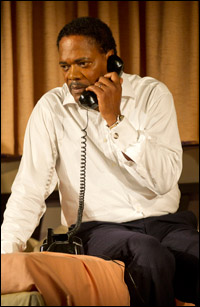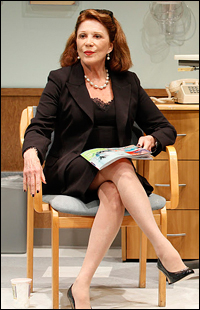
It's doubtful he'll get another Tony for Man and Boy, the little-known 1960s Terence Rattigan play that was revived this week by the Roundabout Theatre Company. But the admiration of Langella's magnetic skill was, as usual, unbridled. "Few performers are as good as Mr. Langella at using an actor's instinctive narcissism to capture the egomania that fuels (and sometimes topples) the wildly successful," wrote the Times about the actor, who here played a shady financial titan caught in a scandal and on the brink of disaster. (The play was doubtless dusted off due to its evocation of contemporary Wall Street villainy.) Time Out New York agreed: "It's hard to imagine a more commanding and forceful actor in the city. Langella is such a master manipulator of space and time, it's hard to believe that his character is destined for a semitragic fall."
But critics largely limited their good words to Langella's work. Many found Man and Boy to be second drawer Rattigan—an amusing circumstance since American theatre critics have precious few opportunities to view any of Rattigan's many plays. Langella's co-stars, particularly Adam Driver, who plays his tragic son, were thought to not be up to the master's level, thus throwing the production out of balance. That said, some scribes were willing to allow that the play made for "first-class entertainment."
***
| |
 |
|
| Samuel L. Jackson in The Mountaintop. | ||
| photo by Joan Marcus |
The buzz surrounding this production has been less about the new work and fresh playwright—the play won the Olivier Award in London—than the star casting of Samuel L. Jackson and Angela Bassett. Critics were split on the duo. Some found them miscast, while the Times said Jackson gave "an engagingly low-key performance." The play itself was also given mixed grades. One writer called it "as audacious as it is inventive," while a differing colleague damned it as "an awkward, mawkish blend of docudrama, surreal whimsy and pandering black-history triumphalism." As for the surreal, Big Picture surprise twist at the end of the drama, if you liked it you agreed with the reviewer that said it was "a fantastic pay-off that ranks among the most exhilarating 10 minutes of the year." If you didn't, you're with the guy who said it turned "a mediocre biodrama into a ridiculous embarrassment."
***
Off-Broadway, Manhattan Theatre Club pulled back the curtain on the world-premiere production of We Live Here, the New York playwriting debut of rising actress Zoe Kazan (Angels in America, A Behanding in Spokane, The Seagull). For the production, MTC assembled a fine cast, led by Amy Irving and Mark Blum, led by hot director Sam Gold.
The gathering talents did not, however, help a play that the critics found "programatic," "contrived," "boilerplate" and short on subtext and subtlety. Reviewers found too familiar the family dysfunction territory that the drama tread. And a couple reviews seemed to take MTC to task for producing a play that was not ready for public consumption on a major stage.
***
| |
 |
|
| Linda Lavin in The Lyons. | ||
| photo by Carol Rosegg |
In fact, the general consensus was that Silver had turned out his best play in more than a decade—in "16 years," in the precise estimation of the Times. Also his "best dialogue in ages," according to the Post, and "snappy dialogue, curvy plot twists and a topflight cast perk things up and make up for the fact that we've been down this road, or thereabouts, before." Bolstering this happy circumstance was a fine cast, led by critics' darling Linda Lavin. One abashed critic said her performance as a manipulative, self-involved mother was "the color of delicious." There's a phrase you don't here often (and a good thing, too).
***
Finally, monologist Mike Daisey began performances Oct. 11 at the Public Theater on what is suddenly the most topical play in town: The Agony and the Ecstasy of Steve Jobs. The engagement begins less than a week after the Apple co-founder died at the age of 56.
The piece, which Daisey has performed elsewhere, is not the most flattering assessment of the technology mogul. In it, the actor shares stories of his own travels to China to investigate the factories where millions toil to make iPhones and iPods.
Daisey, cognizant that many are currently feeling sentimental toward Jobs, said in a statement, "This moment is an opportunity to peel back the surface and get at the secret heart of our relationship with Steve Jobs, his devices, our labor, and China itself. We live in denial about China: a relationship that so disturbs us that we pretend our devices are made in magical Willy Wonka-esque factories by space elves instead of the real human cost we all know in our hearts has been paid. Steve Jobs was famous for his unsentimental directness, his ability to ignore nostalgia and demand the unvarnished truth, however difficult. I admire that, and these performances at this precise moment are an opportunity for us to together rediscover out how alive theatre can be when we don't know all the answers."











